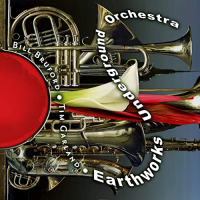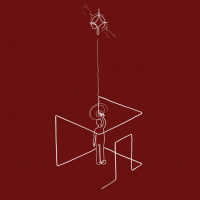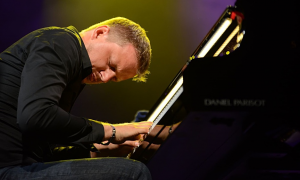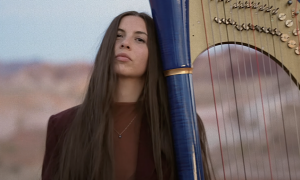Home » Jazz Articles » Interview » Marc Edwards: Free Jazz Drummer & Percussionist
Marc Edwards: Free Jazz Drummer & Percussionist
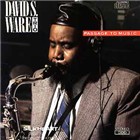 ME: Not exactly, upon graduating from high school, I went to Boston to study at the Berklee School of Music. Today they call themselves the Berklee College of Music, however, it is the same institution. I have many fond memories of my stay in Boston. I choose Berklee because I had learned that Tony Williams studied with Alan Dawson. I didn't get to study with Alan the first year I was there. I did get him the following year. I studied with Les Harris and Gene Roma before I got Alan Dawson. It was there in Boston that I met David S. Ware and Gene Ashton (pianist). Most people know Gene by his new name, Cooper-Moore. We met and through talking with David S. Ware, David decided to use me in the band Apogee. I arrived in Boston after a long drive from New York City. My mom had asked my grandfather to make the long drive to Boston. After I checked into the dormitory on Newbury Street, I explored the city and visited Berklee.
ME: Not exactly, upon graduating from high school, I went to Boston to study at the Berklee School of Music. Today they call themselves the Berklee College of Music, however, it is the same institution. I have many fond memories of my stay in Boston. I choose Berklee because I had learned that Tony Williams studied with Alan Dawson. I didn't get to study with Alan the first year I was there. I did get him the following year. I studied with Les Harris and Gene Roma before I got Alan Dawson. It was there in Boston that I met David S. Ware and Gene Ashton (pianist). Most people know Gene by his new name, Cooper-Moore. We met and through talking with David S. Ware, David decided to use me in the band Apogee. I arrived in Boston after a long drive from New York City. My mom had asked my grandfather to make the long drive to Boston. After I checked into the dormitory on Newbury Street, I explored the city and visited Berklee.
The next day, I returned to Berklee to get my ID photo taken. I walked from the dorm to where Berklee's main building is on Boylston Street and got in line with a few of the guys also living in the dorm. It didn't take long for us to get our new IDs. I explored the building and discovered the rooms where students are allowed to practice the piano. During this brief excursion, I noticed a big heavy set brother composing at the piano. I looked through the window, listening to the music he was creating. I left and continued checking out the other musicians on this floor. None were doing anything compelling as the brother I had seen in the first room. I went back to this room and stood there for several minutes. The brother took note of my presence and he invited me into the room. He continued writing music while he asked me questions. I told him my name and that I was interested in learning to play free jazz. "So, you want to play free jazz? He asked, as he kept writing music and having a good hearty laugh. I learned during this conversation that his name was David Ware. David would laugh because he knew the obstacles to playing this music are extra tough. It takes the strongest artists to make it in this musical genre.
David began using his middle initial during the seventies when we did the album, Birth of a Being on HatHut Records. I didn't know he was already highly developed on his instrument. We connected and this began a long musical association that lasted until the end of 1990. We stayed in the room for about an hour. During that hour, another friend entered the room. His name was Lawrence Sands. Larry had met David the previous semester. They talked for a few minutes and David introduced me to Larry. Larry was to play a major role in my life, more on that in a little bit. When David had completed his compositions, we went downstairs to get something to eat.
Larry Sands also played tenor saxophone. Larry formed a group and I played with him and another tenor saxophonist by the name of Ted Nye. Bill Washer played electric guitar. Bill went on to work with Joe Henderson and he did appear on one of his records. I can't remember what we called ourselves, the name of the band. What was noteworthy was that Larry used concepts that moved us away from the high energy approach. He insisted that we use softer dynamics on certain pieces. Most free jazz musicians tend to lock in the high energy exclusively.
I kept in touch with David and attended a rehearsal, at his request, that afternoon, or it could have been the next day. The band consisted of Stanton Davis, trumpet, Bobby Eldridge, baritone sax, Jim Schapperoew on drums, Don Pate on bass, and Cedric Lawson on piano. These guys sounded great. This was the first time I heard David play the tenor saxophone. He did an inspired performance on his instrument. Other musicians in the room were whispering and pointing to him while he played his solo. Some even shook their heads. One musician sitting not too far from me said, "What the bleep? I'll never be able to play like that guy. He sounded like he wanted to quit playing his instrument. Good players can have that affect on aspiring musicians.
Others were slapping each other five saying "He's a bad mother f.....! I thought to myself, "This cat may be fat, but he sure knows how to blow the horn! When the rehearsal ended, Stanton talked to David about other matters. David told him he had met a young cat who wanted to play the music. Stanton asked more questions but David told him, "You don't know him. He's a new cat, David replied as he was wearing dark sunglasses, Mr. Cool, in the flesh. All he needed was a pack of cigarettes to complete the cool image he was projecting. I was standing about three feet away from David when he told Stanton this. I would later call David, "Mr. Yoga. That was an inside joke that only he and I knew the punch line. He would laugh and laugh when I called him that. It would really crack him up.
David did get to hear me play at an ensemble class in school. I was a beginner musically speaking and had a long way to go. David liked what he heard and for this reason, I believed he felt that I would work out fine being the drummer for Apogee. A veteran drummer on campus, Art Gore, also heard me play and he was very complimentary about my playing. I saw Art work with George Benson before George started singing, humming along with playing the guitar at the Jazz Workshop, a popular club in Boston. George's roots are in jazz, but I doubt that many of his fans know that. They began hearing about him when he redid "On Broadway, a popular song from the fifties.
I never cared for the song until I saw it used in the movie, All That Jazz. Visually, the music fit right in with what viewers were seeing on the screen. George Benson got very big after that. "This Masquerade was Benson's first hit. I always thought he sounded like Stevie Wonder on that song. Make no mistake, George knows music very well. Quincy Jones was impressed with his playing skills. He knew George was exceptionally talented when he asked George to play the lines up a half step or greater interval. I saw George helping singer Patty Austin learn her part. George had his part down cold. This program aired on Public Television.
And, here's a true story of how I almost met David S. Ware before I arrived in Boston. I was in the Village one night and as I walked down the street by the Village Gate, Miles Davis was there. I had already seen him, so I kept on walking. I came to a small club and the sign said Albert Ayler was playing that night. I didn't have enough money to get in. I pleaded with the man on the door to let me in. He took note of my desire to see Albert. He couldn't let me in however he did say, "Albert will be here tomorrow night. Come back with the money and you'll be able to see him play. I said, "Okay, I'll do that. I came back the next night and was sorely disappointed to learn that Albert Ayler had left the club. I guess something had happened and he didn't want to play there a second night. I was very angry at missing this opportunity to see Albert. After I got to know David, he told me that he was in the club that night. It seems that we were destined to meet one way or another. class="f-right"> Return to Index...
AAJ: What other musicians did you meet while you were attending Berklee?
ME: I should mention I met drummer Don Sweatt, a very talented drummer at Berklee. He could play jazz but he excelled at playing funk extremely well. Irvine Elligan, III was very good at arranging songs (charts as we called them at Berklee). We had many long discussions about music and my growing interest in Indian spirituality. Irvine couldn't get into that, but he loved talking about music. He graduated from Berklee and taught there for a short time. Irvine did a beautiful arrangement of one of the Fifth Dimensions songs, "Paper Cups. Tenor saxophonist Junior Cook was in the room. Junior Cook taught at Berklee briefly for a few years. He was impressed and went over to checkout Irvine's arrangement afterwards. I was so proud of Irvine. The musicians in the ensemble liked the chart too.
I can recall a trumpet player by the name of Eric. I can't recall his last name. Eric had perfect pitch. I was in his room at the dorm and I played a chord. I asked Eric the name of the chord. When Eric gave his answer, I said, "I got you. That's not the chord I played. I already had been informed that Eric had perfect pitch. Eric didn't argue; he came over and said, "Play the chord again, Marc. I did and Eric played a different note on the instrument that I was blowing. We could both clearly hear that he was right. I had heard the chord one way; Eric heard another chord which contained the notes of the chord I was playing, blowing into this keyboard wind instrument. I told Eric, "Okay, now let's see if you can get this one! Eric burst out laughing when I said that. I was amazed at the phenomenon musicians call "perfect pitch. I don't have it. Maybe in a future lifetime, I will develop this ability. Eric's main focus was funk.
Another musician by the nickname of El Dorado was also interested in this music. During that period my attention was on free jazz. I didn't approve of the dance music. My position has changed dramatically, as I've come to realize that the music of James Brown, Sly and the Family Stone are valid musical expressions. The music during the sixties was far superior to the stuff we're hearing today in hip hop.
There was another talented funk drummer whose real name I've forgotten. We called him "Smoky. Smoky was the funkiest drummer I've ever heard. If James Brown had heard him play, he would have had one of his representatives make him an offer to work in his band pronto. Smoky was in a class by himself. He was just as good as some of the drummers that have helped James Brown get to where he is today. I have no idea what became of him.
Robert Garcia was another monster jazz drummer. The only information I have on him is that he once played in the marching band for Florida A & M. This college drum & bugle corps stood out above the rest back in the day. Their routine was completely different from what other colleges were doing during that era. I loved Robert's playing, he was also physically strong. Alan Dawson spoke favorably about Robert Garcia. He went to New York and tried out for a few groups and no one took him. I could never understand that. The last I heard he got a day job driving a truck. I never saw him again. I have seen a Robert Garcia listed in the papers such as the Village Voice, performing at some of the clubs; however, I don't know if he's the same Robert Garcia I met at Berklee.
I saw two composers at the school, although I didn't get to know them: Alan Broadbent and Alan Silvestri. Alan Silvestri did the soundtrack for the movie Predator. The CD [of the soundtrack] is out of print. I cannot understand why Hollywood allows certain popular soundtracks go out of print. It doesn't make any sense. Alan Silvestri continues to write scores for motion pictures today.
Tenor saxophonist Billy Pierce was at Berklee while I was there. He now teaches at the school. Abe Laboriel was a monster on the electric guitar. He changed to playing electric bass afterwards. He has a video out which teaches young musicians how to play this instrument. Abe has worked with Al Jarreau, George Benson and Quincy Jones, Johnny Mathis, just to name a few. I have seen Johnny Mathis sing at Radio City Music Hall. At the time, I was more interested in dancer/actress, Debbie Allen of the Fame TV show, a very short-lived series. She performed before Johnny came on.
I also met drummer Keith Copeland. I saw Keith on television playing with Dr. Billy Taylor. I met trombonists Art Baron and John Licata at Berklee. Art has worked with just about everybody in the music business including Stevie Wonder. Art Baron was the last trombonist Duke Ellington ever hired. I met an attractive singer while I was at Berklee. I remember her first name only, Janet. David had an interest in her is all I can say. She did work with Abdul Hannan.
Abdul Hannan was one of the more interesting musicians living in Boston. He played alto saxophone and flute. I recall Abdul because he did a recording with David called The Third World , (RITE, 1968). I never bought the album. The last time I saw Abdul, he was playing on 42nd Street next to the headquarters phone company building, 1095 Avenue of the Americas, sixth avenue. Abdul was on the other side of 42nd Street holding captive a small crowd of listeners with melodious sounds from his flute. Adbul Hannan made an impression because he was very intelligent. He always knew how to uplift my spirits. If anyone knows his whereabouts please get in touch. My email is provided at the end of this interview.
Bassist Chris Amburger did attend Berklee. I didn't play with him in the ensemble classes. Bass players were in great demand during that period. Chris did join Apogee, however his appearances were rare at times. There were other musicians I met, however, I can't recall them at the moment. class="f-right"> Return to Index...
AAJ: Where did you go to hear live music in Boston?
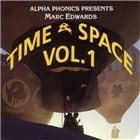 ME: The second advantage of my stay in Boston was that I was able to see many of the jazz greats at the Jazz Workshop. It was right next to another club called Paul's Mall. I hung out at the workshop and met many musicians playing in the bands of famous jazz artists. I saw Rahsaan Roland Kirk and Thelonious Monk at the Jazz Workshop many times. Rahsaan always put on a good show. The first time I saw him was one of the few off performances I caught. The rest were dynamite! David S. Ware and I went to eat at a Chinese restaurant on Mass Avenue after the show. When he asked me what I thought of Roland, I replied, "I didn't enjoy his playing that much. David said Roland had an off day performance-wise and that I should catch him the next time he came to Boston. David was right. The rest of the shows that I saw of Rahsaan Roland Kirk were sheer joy. Roland knew how to move an audience.
ME: The second advantage of my stay in Boston was that I was able to see many of the jazz greats at the Jazz Workshop. It was right next to another club called Paul's Mall. I hung out at the workshop and met many musicians playing in the bands of famous jazz artists. I saw Rahsaan Roland Kirk and Thelonious Monk at the Jazz Workshop many times. Rahsaan always put on a good show. The first time I saw him was one of the few off performances I caught. The rest were dynamite! David S. Ware and I went to eat at a Chinese restaurant on Mass Avenue after the show. When he asked me what I thought of Roland, I replied, "I didn't enjoy his playing that much. David said Roland had an off day performance-wise and that I should catch him the next time he came to Boston. David was right. The rest of the shows that I saw of Rahsaan Roland Kirk were sheer joy. Roland knew how to move an audience.
One memorable performance happened during the Jazz Pop bookings that George Wein experimented with during the late sixties. Rahsaan and his band played at this festival. I was curious to see Frank Zappa and the Mothers of Invention. When Frank Zappa and his band came on, the band members began making verbal nonsensical sounds. The audience promptly got up and started leaving the Memorial Auditorium. They were not going to have their intelligence insulted. One by one, folks started getting up and leaving. George Wein didn't want the show to end poorly. He asked Rahsaan to go back on stage and play again. When he began playing, people came back and sat down in their seats. The band began playing "Louie Louie, another popular song from the fifties. Some of you may recall this song from the movie, Animal House. Roland sounded good. This venue was near the Boston Sheraton Hotel.
AAJ: That's an incredible story. Readers and Frank Zappa fans may think you're making this up. Is there any documentation regarding this incident?
ME: Frank Zappa never played a note. He stood on stage and smoked a cigarette. The concert took place on January 31, 1969. This was the Boston Globe Jazz Festival. The next day, or it could have been a day or two later, the Boston Globe showed a photo of Frank Zappa smoking on stage with a clearly visible no smoking sign in the background. The photo struck me as being surreal, like a Dali painting.
This was the only time I got to see Frank Zappa. I hear that his live shows were great, however, I didn't see it that night. I take my shows seriously in the sense that I understand this may be someone's only chance to see me in this lifetime. I try to leave a more positive impression. Artists must play and not do what Frank Zappa did. I really wanted to see him play. I'm mentioning this story so that upcoming musicians won't take their shows for granted. I mean no disrespect to Frank Zappa, the word of mouth about him is that he always did great shows. As I said before, I didn't see it on this particular night.
I wish Mr. Wein had continued in this direction. If he had, jazz would be in a different place today. Miles Davis shares, in his autobiography with Quincy Troupe, that Tony Williams suggested they open for the Beatles. Imagine where jazz would be today if Miles had acted on this tip?
Monk came to Boston often. During the week, attendance was sparse however, from Thursday night on, the place was usually packed. The first time I saw Monk, he got up from the piano and started dancing. I had heard that he sometimes liked to do this. Miles Davis was one of the few artists who could pack almost any venue whenever he played. Once I started listening to his records, I fell so in love with his music that I would run into Miles Davis at odd hours of the day and night whenever he came to Boston. I once saw him leaving Berklee. He had been in the school and no one recognized him! On one occasion, I saw him and I stared at him so hard he turned sharply and looked at me. He was standing between two cars and waiting to cross the street. I quickly apologized and said, "I thought you were someone else. He found my comment amusing and he started laughing as he walked across the street. This must have been around 2 AM on a week night. Had I been a little less shy, I might have been able to talk to Miles. Despite his standoffish demeanor, he was approachable.
McCoy Tyner was a frequent visitor to the Jazz Workshop. I met drummer Eric Gravatt when he came to Boston. We have stayed in touch although it's been many years since I last saw him. I saw him many times with McCoy's band and later with Weather Report. Eric had an uncanny knack of playing funk rhythms behind McCoy Tyner. I never heard this in McCoy's music. To my astonishment, this approach worked. Elvin Jones usually came to Boston and always did great drumming leaving drummers with their jaws on the floor. Some of the drummers who were into Buddy Rich said Elvin had no technique. My tutor, Lenny Nelson, told me that Elvin and Buddy Rich once had a drum battle. He said "Cats may say that Elvin has no technique, but Buddy Rich had a heart attack shortly after that event. Lenny felt that Elvin had pushed Buddy in his own way playing what he plays. That's not bad for a cat who has no technique!
Elvin Jones had a good sense of humor. I went to speak to him after he finished his first set one night. When I shook his hand, he began applying pressure on my hand and fingers with a vice like gripe. I looked at him and he had a mischievous grin on his face as he noticed my discomfort. Elvin was something else. He is one of my main influences on the drums. There are many others and it's mostly the jazz greats that I dip into the ocean for inspiration. Some of the writers think I'm influenced by other free jazz drummers. That's completely false; it's way off base. I'll repeat—my influences are the traditional jazz drummers from bebop, the Big Band era and others.
AAJ: You say you're influenced by the traditional jazz drummers? How can that be, you're a free drummer?
ME: Not really. My playing style is more inside than most writers realize. Listen closely to what I'm playing; you'll hear a lot of inside ideas and concepts that are used by traditional jazz drummers. I had the opportunity to talk about why Free Jazz Isn't Really Free at the Knitting Factory as part of their defunct Jazzhool series. This took place on October 19, 2000, from 2 - 3 PM and was broadcast live to schools in the Northeast quadrant via the Internet. I believe Verizon was the sponsor for this event using DSL to broadcast this in real time. I clearly demonstrated what it is I'm doing and why it's not free. It only sounds that way, but, it's far from being free. Think of it as an audio illusion. The sounds I create fool the ear into thinking they're something that they're not. We're sorry to disappoint music fans; there really is no free music. It is not possible in this dimension. Music is based on melody, harmony and rhythm. A musician can never get away from those elements completely.
AAJ: Who else did you see at the clubs?
ME: I didn't go to the clubs alone. Usually, David went with me or some of my fellow students from Berklee went to checkout specific jazz artists. I didn't see everybody, mostly the ones I liked and they happened to be some of the jazz greats. Yusef Lateef, Stan Getz, Deodato (though he wasn't a jazz great), Pharoah Sanders, and many others who were working during that time period. I should also mention that during the summer school break, I would return to New York City and catch musicians at Slugs on the lower East side. It was there that I saw Tony Williams with Larry Young on organ and John McLaughlin on electric guitar. The club didn't have very many people in it that Friday night. That didn't stop Tony and company from tearing down the house. I remember a very sexy thin black woman was the sole waitress in the club. She may have been a dancer; she had a dancer's body. Slugs is where I first saw Pharoah Sanders. He had a hit with his Karma record at the time. That recording received a lot of air play on the radio. I met Billy Hart when he played with Pharoah. This began our relationship.
I also enjoyed bassist Jimmy Garrison as he usually made those gigs with Elvin. They had a bad falling out one night in Boston and after that we didn't see Jimmy with Elvin anymore. One of my classmates, a student at Berklee, witnessed this event. I had a ball hanging out with Jimmy Garrison and Elvin Jones. Jimmy was a real ladies' man. He was always talking to attractive females who came to the club to see Elvin play. I was talking to a lady whom Jimmy was very interested in and he came over and said, "Get away from her Marc! Jimmy said it in a joking manner and we all laughed. Jimmy looked good just like he did when he was with John Coltrane.
The last time I saw Jimmy Garrison was in my old neighborhood when he played on the Jazzmobile at 159th Street, between Amsterdam Avenue and Broadway. This was an annual event that took place around September. Jimmy looked terrible. The effects of his drug use were very obvious to all but when he picked up the bass and started doing what musicians call "walking, the young children listening to the music would start dancing to the rhythm of what Jimmy was playing. They would move their body in time to the sounds Jimmy was making. Very curious, why is it that young children can hear jazz and some of the writers can't? The Jazz Workshop closed and is no longer in business. This is a major blow for the Boston area. It was located across the street, not far from Lord & Taylor which is near the Prudential Center on Boylston Street. This area has been upgraded tremendously in recent years. I'm surprised film makers don't use this location for some of their movies. The area looks great and is visually quite stunning. I would love to see Boston officials add a jazz club to this location. It's easy to get to the Prudential Center with the public transportation. class="f-right"> Return to Index...
AAJ: Tell us more about Apogee, your band with David S. Ware and Cooper-Moore.
ME: To answer your question about Apogee, the group didn't get started until around 1970 or 1971. We would get together everyday and play. This is how we developed. I won't go into specifics as to what we were actually doing. Just get together with the guys in your band and play as often as you can. Any band will grow using this method. Apogee wasn't my band. It was a cooperative according to Gene Ashton (later Cooper-Moore). A cooperative means no leader. All of the members are equal partners. We found out otherwise when Gene learned that David took the Birth of a Being tapes to Hat Hut Records. David put the record out under his name. He told us, the guy at Hat Hut wouldn't take the group as a collective. I had my suspicions; however I had no proof of any wrongdoing. I held my tongue and kept my thoughts to myself. Gene Ashton had put up the money to do the recording in the first place. David chose not to share this piece of information. I didn't learn this until many years after the fact.
We once did a concert at the Old North Church in Boston. I had the impression that we were losing the audience. I began to play Latin & African rhythms on the drums. This provided the necessary spark for Apogee and we were off and running. When we finished our performance, a very strikingly beautiful black woman came up to me. She looked like an actress; she was a very attractive female. She started hugging and kissing me. She really enjoyed the music. Today, I seldom see black folks atfFree jazz performances. Things have changed over the years, and not for the better. I didn't ask this lady for her telephone number since I already had a girlfriend. She was drop dead gorgeous. Chris Amburger did perform with Apogee on another occasion at this venue. We played on a music festival. There were numerous bands playing at the church, including a good Gospel choir. They were singing and started getting into that sanctified feeling. I was impressed because they locked into this feeling almost from the very start of their show. The host was a black guy who did a jazz program on the radio from Boston University. We did play on the radio show once. It was during this performance that I found my sound. It happened by itself spontaneously. I've been playing this way ever since this radio broadcast.
Apogee was a wonderful band that most jazz writers missed. Most concentrate on the Art Ensemble of Chicago and other groups of that era. I've yet to hear a band that could match Apogee. We rehearsed nearly every day and we knew what we wanted to play, musically speaking. Apogee did perform once at the Jazz Workshop. Charles Mingus was in town. David and Cooper-Moore went down to see him. They spoke to him on the break and asked if we could sit in. Cooper-Moore told me, "Marc, David was so arrogant about it. He was so arrogant, emphasizing something I know all too well. He told Mingus, "We don't want to play with you. We want to play by ourselves, with our band , not sit in with all those other cats.
Mingus just looked at David when he said that. He didn't say a word. I guess he was thinking whether or not to pop David in the mouth! ...Just kidding. When Sunday afternoon arrived, I had to leave my job early in order to play at the workshop. I had gotten myself a job playing drums in the Combat Zone at a club called the Two O'clock Lounge formerly on Washington Street. I would walk on Boylston Street until I got to Washington Street.
The previous drummer, Fred Wren, had decided to pursue his musical interests in New York City. Fred was also a talented artist. He showed me some of his pencil drawings. I was trying to hook up with Fred Wren when David was driving along Boylston Street, we saw Fred walking towards us. I got out the car and talked to Fred, asking if he was still leaving the club and if he wanted me to replace him. Fred answered in the affirmative. He told me when to come to the club. I started working at the Two O' Clock Lounge shortly thereafter. Fred Wren did move to New York City and things didn't go as he had planned. He ended up being homeless for a long time. The last time I saw Fred Wren, I hardly recognized him. He was off the streets and had apparently gotten himself a day job. Many musicians are opposed to working day jobs; however, most could use the disciple that a day job provides: getting to work on time, turning in the assignments on time, etc.
Working at the Two O' Clock Lounge was an unforgettable experience. I was a young man playing drums behind women taking their clothes off, every stitch of clothing, almost every day. When it was close to election day, the ladies would take everything off except their G string. At first, I was very judgmental because of my Christian upbringing. I talked about the ladies with Gene Ashton. "Those sluts, they take their clothes off everyday for money. They're nothing but sluts! Gene Ashton provided sage consul and I was able to tolerate the environment much better after he talked some sense into me. I've seen so many naked women, when on occasions I've entered the wrong area where women were dressing in later years, most will cover themselves and tell you to get out. I can pretty much figure out what they look like after my tenure at the stripper club. Thank God I had a girlfriend! I would have gone insane without one. A naked woman will have an effect on a young man.
We arrived at the Jazz Workshop and Mingus' band was playing very well. When they finished playing, Charles Mingus asked if any musicians wanted to sit in. Several local musicians went up and began playing. After they finished, David, Cooper-Moore and I went up to the bandstand.
I think Don Pullen or tenor saxophonist George Adams spoke to Mingus on Apogee's behalf. Mingus may have forgotten that we wanted to play by ourselves, not with the many musicians who came on stage previously. Just before I sat down at the drums, Mingus' drummer—it wasn't Dannie Richmond—asked my name. When I gave my name, he said, "I've heard of you. We did a short but torrid twenty minute set. I would've liked to have played longer but on this day, I was tired and I think David and Cooper-Moore were tired also. Mingus came up on stage and asked if we wanted to play more. David and Cooper-Moore both said no. I was glad; I didn't have anything left either. We received several rounds of applause from an enthusiastic crowd attending the matinee performance.
The next night, I was in the Jazz Workshop, I asked one of the waitresses what she thought of the band that sat in yesterday. She recognized my face and said, "You were in that band. You sounded great. This was the only time Apogee played at the Jazz Workshop. I don't recall the date when this happened. This took place at the Sunday matinee afternoon performance. Normally those performances were held from 4 - 7 PM.
AAJ: I'm very surprised to learn that David S. Ware was arrogant with the great Mingus. Did he have a personal reason to be rude?
ME: David has always been a handful! He was always headstrong and it may appear to others as arrogance. When you have a strong musician and he knows he's good, that can carry over into their normal everyday behavior. David tends to be high strung. When he talks it may sound like he dictating, telling folks what he wants. It's part and parcel of the David S. Ware's creative makeup. It's hard to separate one aspect from the other. It's an amalgam of different elements that give rise to David S. Ware's creativity. He has major issues to resolve; don't we all? This was in the past. He's probably a different person today.
Regarding Mingus, I found that Mingus was approachable. However, I could tell he was filled with stress. Remember he was around before the Civil Rights Movement. That means he along with many other black people had to swallow a lot of bullshit. Mingus was known to have a fiery temper and I've heard stories that he would punch club owners in the mouth if they didn't pay him fairly. He didn't tolerate any nonsense. In this case, it's not that he was temperamental; he went through a lot of stuff. Artists are often treated poorly in America and around the world. Most of us swallow it and move on. Not Mingus, I've been told he'd punch you in the face. If I did that, I'd end up in jail. You can't engage in this type of behavior anymore. Things have changed and there are those who will sue you simply because they think they can get a few dollars out of the process. It's all about the money now. Most musicians know to channel their anger into their music and not punch people in the face.
AAJ: Talk more about Apogee. While you're at it, who is Lenny Nelson?
Tags
PREVIOUS / NEXT
Support All About Jazz
 All About Jazz has been a pillar of jazz since 1995, championing it as an art form and, more importantly, supporting the musicians who make it. Our enduring commitment has made "AAJ" one of the most culturally important websites of its kind, read by hundreds of thousands of fans, musicians and industry figures every month.
All About Jazz has been a pillar of jazz since 1995, championing it as an art form and, more importantly, supporting the musicians who make it. Our enduring commitment has made "AAJ" one of the most culturally important websites of its kind, read by hundreds of thousands of fans, musicians and industry figures every month.



